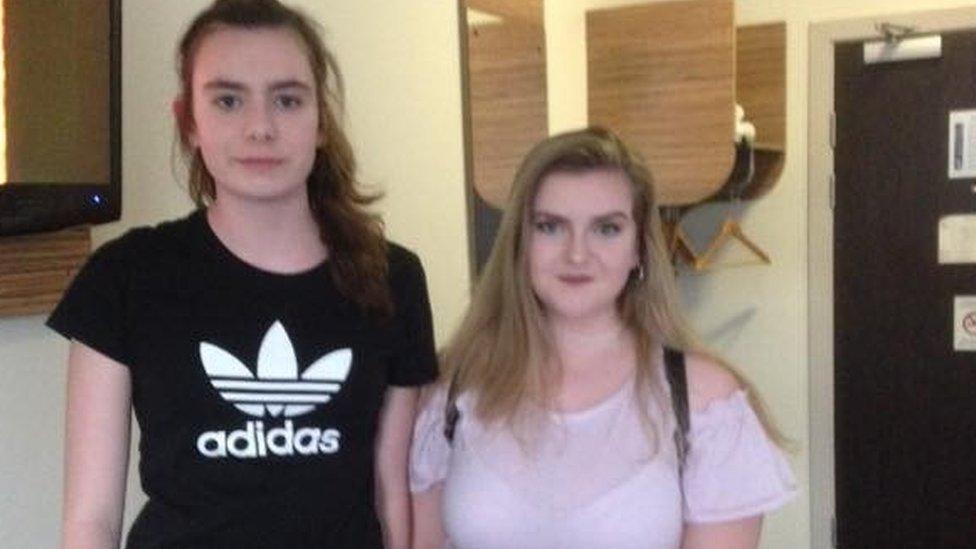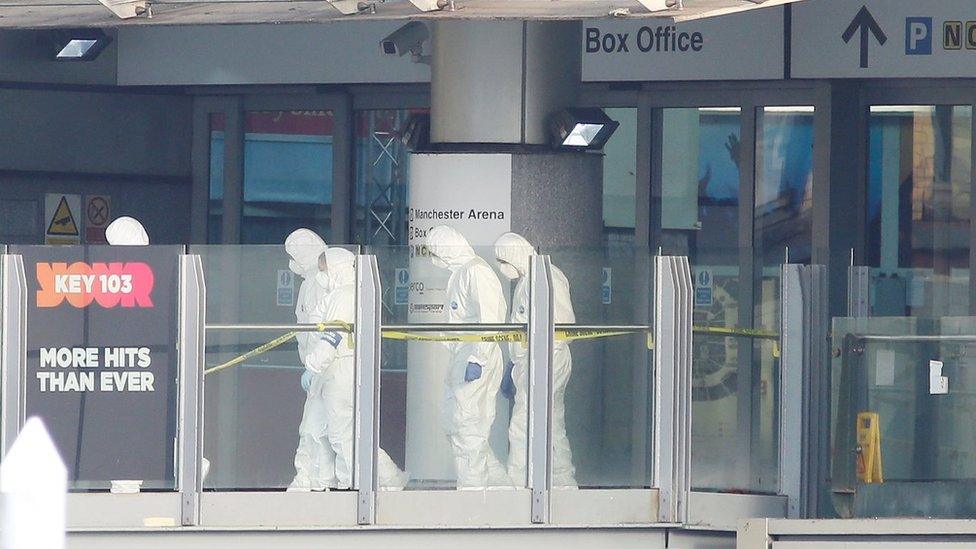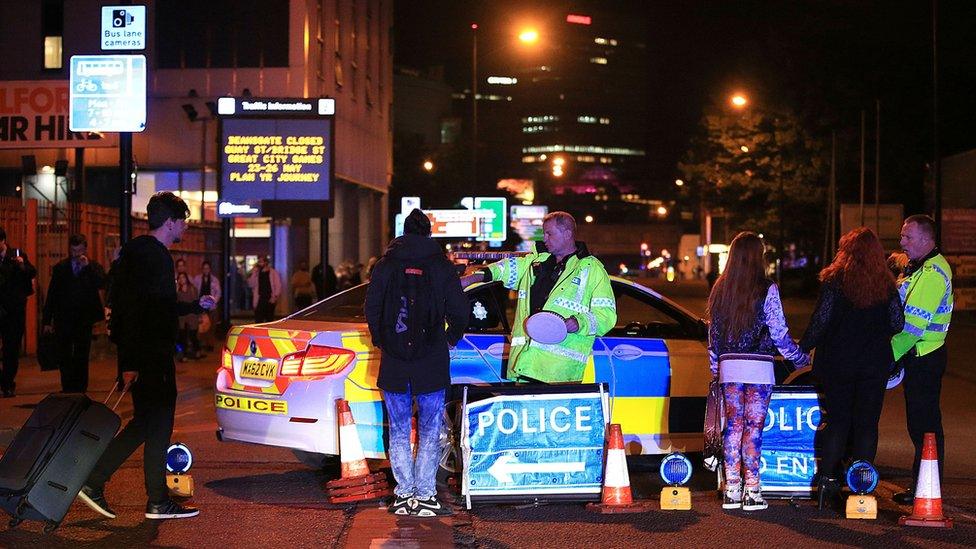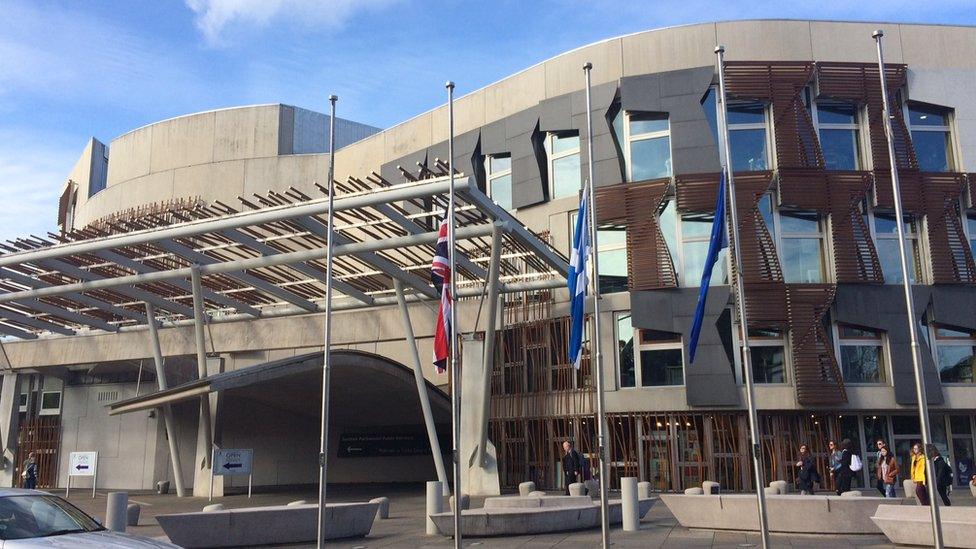Manchester Arena attack: Sturgeon confirms Scots in hospital after bombing
- Published
Nicola Sturgeon says the attack was "callous" in its targeting of children and young people
Six Scots were treated in hospital after the Manchester suicide bomb attack, the country's first minister has confirmed.
The attack in the foyer of the Manchester Arena at the end of a concert by singer Ariana Grande killed 22 people and injured a further 59.
Nicola Sturgeon said four of those in hospital had since been discharged.
She is due to hold another meeting after the UK threat level was raised to its highest "critical" level.
She said: "I have been briefed this evening by the National Security Adviser regarding the Joint Terrorism Analysis Centre's decision to increase the threat level from severe to critical, and to invoke Operation Temperer.
"The resilience committee will convene tonight to allow me to discuss with ministerial colleagues and Police Scotland the practical implications for Scotland and ensure that all appropriate actions are being taken.
"The public should not be unduly concerned but should remain vigilant.
"In the meantime, our thoughts remain with all those affected by this dreadful atrocity."
Explosive device
One of the teenagers from the Isle of Barra who was unaccounted for after the attack has been found alive in hospital. in Manchester.
Fifteen-year-old Laura MacIntyre is said to be seriously injured. Her friend, 14-year-old Eilidh MacLeod remains missing.
Ms Sturgeon said none of the six Scots known to have been treated in hospital were thought to have life-threatening injuries.
Police have named the suspected suicide bomber as 22-year-old Salman Abedi, who died in the blast after detonating an improvised explosive device he had been carrying at about 22:35 on Monday night.
A number of children are among the 22 people confirmed to have died. A 23-year-old man has been arrested in connection with the incident.
So-called Islamic State has said it was behind the attack, via IS channels on the messaging app Telegram.
Security has been stepped up at key locations across Scotland as a precaution, with a "significant" increase in the number of armed officers on patrol at transport hubs and other crowded places.
Police Scotland will review security at all public events in the next fortnight as a result of the Manchester attack, including the Scottish Cup Final on Saturday.
Officers are also at motorway service stations as part of efforts to identify potential witnesses returning to Scotland from Manchester.
Following an earlier meeting of the Scottish government's resilience committee on Tuesday night, Ms Sturgeon said her government and Police Scotland had liaised closely with the UK government and police forces in England and Wales.

Laura MacIntyre (left) has been found in hospital with serious injuries. Her friend Eilidh MacLeod is still unaccounted for
She also said: "Police Scotland are providing support to the families of Laura MacIntyre and Eilidh MacLeod from Barra.
"Both families have asked for privacy at this difficult time. Our thoughts go out to them and to the families of everyone who has been caught up in this tragedy.
"Scotland stands together, in solidarity, with the people of Manchester - we will not be divided by those who seek to destroy our way of life."
Ms Sturgeon earlier condemned the "dreadful atrocity" and said there could be nothing more cowardly than an attack focused on children and young people.
Speaking after chairing a meeting of the UK government's Cobra emergency committee, Prime Minister Theresa May said the suicide bomber deliberately chose the place where he could cause "maximum carnage".
Mrs May condemned the "cowardice" of the attacker and hailed those who rushed to help, who had shown "the spirit of Britain - a spirit that through years of conflict and terrorism has never been broken and will never be broken".
She vowed: "The terrorists will never win and our values, our country and our way of life will always prevail."
Anyone who has concerns about loved ones should contact the Greater Manchester Police emergency number on 0161 856 9400.

Analysis: Gordon Corera, BBC security correspondent
The UK threat level has been has been judged to be severe for nearly three years - which means an attack is considered highly likely.
But in recent months the tempo of counter terrorist activity has been increasing with - on average - an arrest every day.
After the attack in Westminster by Khalid Masood in March, police and security officials have been warning that further attacks were almost inevitable.
But they also believed that those were more likely to be low-tech involving knives or vehicles. The fact that the Manchester attack involved explosives will worry them.
It may not have been at the level of complexity seen in Paris in 2015, when multiple attackers sent from Syria used guns and suicide belts, but it will still have required planning to make an improvised explosive device.
Read more from BBC home affairs correspondent Dominic Casciani


Forensic officers were working at the scene on Tuesday morning

Witnesses told of panic and chaos in the aftermath of the explosion
The General Assembly of the Church of Scotland, which is meeting in Edinburgh, held a minute's silence and said prayers for the dead and injured in the blast.
Flags were being flown at half mast at the Scottish Parliament and at council headquarters across Scotland.
A vigil was due to be held in George Square in Glasgow for victims of the Manchester attack.

Flags are flying at half mast outside the Scottish Parliament
Reacting to the news, Scottish Conservative leader Ruth Davidson said: "Terrorism has once again struck our country and, once again, we are faced with a sense of disbelief that someone could be capable of carrying out such an appalling act."
Scottish Labour leader Kezia Dugdale described what happened in Manchester as "a barbaric and sickening attack, targeted at young and vulnerable people enjoying a night at a concert".
Scottish Liberal Democrat leader Willie Rennie said: "My deepest sympathies are with the victims, and with families who have lost loved ones, as well as those desperately waiting for news."